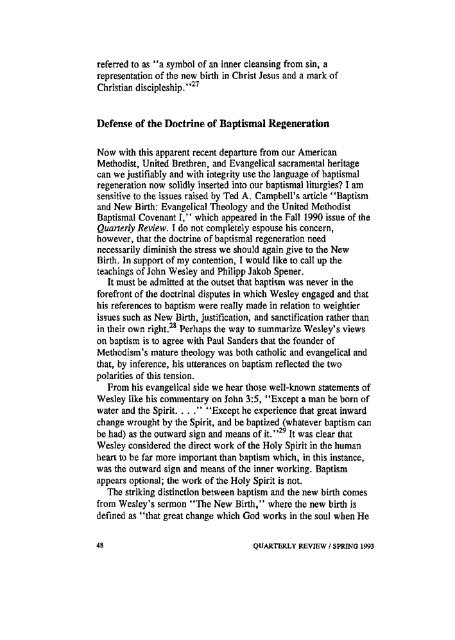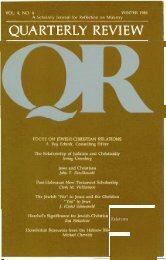TJieodore W. Jennings, Jr. The Meaning of ... - Quarterly Review
TJieodore W. Jennings, Jr. The Meaning of ... - Quarterly Review
TJieodore W. Jennings, Jr. The Meaning of ... - Quarterly Review
Create successful ePaper yourself
Turn your PDF publications into a flip-book with our unique Google optimized e-Paper software.
eferred to as "a symbol <strong>of</strong> an inner cleansing from sin, a<br />
representation <strong>of</strong> the new birth in Christ Jesus and a mark <strong>of</strong><br />
Christian discipleship." 27<br />
Defense <strong>of</strong> the Doctrine <strong>of</strong> Baptismal Regeneration<br />
Now with this apparent recent departure from our American<br />
Methodist, United Brethren, and Evangelical sacramental heritage<br />
can we justifiably and with integrity use the language <strong>of</strong> baptismal<br />
regeneration now solidly inserted into our baptismal liturgies? I am<br />
sensitive to the issues raised by Ted A. Campbell's article "Baptism<br />
and New Birth: Evangelical TTieology and the United Methodist<br />
Baptismal Covenant I," which appeared in the Fall 1990 issue <strong>of</strong> the<br />
<strong>Quarterly</strong> <strong>Review</strong>. I do not completely espouse his concern,<br />
however, that the doctrine <strong>of</strong> baptismal regeneration need<br />
necessarily diminish the stress we should again give to the New<br />
Birth. In support <strong>of</strong> my contention, I would like to call up the<br />
teachings <strong>of</strong> John Wesley and Philipp Jakob Spener.<br />
It must be admitted at the outset that baptism was never in the<br />
forefront <strong>of</strong> the doctrinal disputes in which Wesley engaged and that<br />
his references to baptism were really made in relation to weightier<br />
issues such as New Birth, justification, and sanctification rather than<br />
in their own right. 28<br />
Perhaps the way to summarize Wesley's views<br />
on baptism is to agree with Paul Sanders that the founder <strong>of</strong><br />
Methodism's mature theology was both catholic and evangelical and<br />
that, by inference, his utterances on baptism reflected the two<br />
polarities <strong>of</strong> this tension.<br />
From his evangelical side we hear those well-known statements <strong>of</strong><br />
Wesley like his commentary on John 3:5, "Except a man be born <strong>of</strong><br />
water and the Spirit. ..." "Except he experience that great inward<br />
change wrought by the Spirit, and be baptized (whatever baptism can<br />
be had) as the outward sign and means <strong>of</strong> it." 29<br />
It was clear that<br />
Wesley considered the direct work <strong>of</strong> the Holy Spirit in the human<br />
heart to be far more important than baptism which, in this instance,<br />
was the outward sign and means <strong>of</strong> the inner working. Baptism<br />
appears optional; the work <strong>of</strong> the Holy Spirit is not.<br />
<strong>The</strong> striking distinction between baptism and the new birth comes<br />
from Wesley's sermon "<strong>The</strong> New Birth," where the new birth is<br />
defined as "that great change which God works in the soul when He<br />
48 QUARTERLY REVIEW / SPRING 1993












